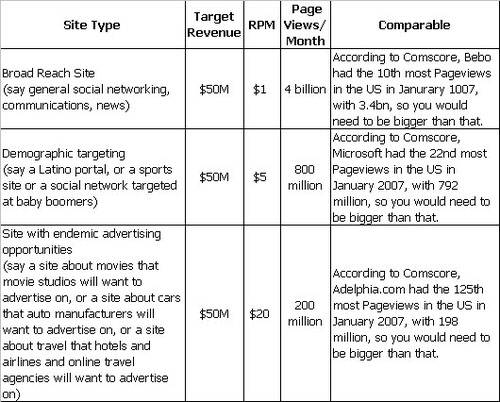How to build a $50M online company is a topic that Dan
Mitchell at the NYT explored recently, taking his cue from Jeremy Liew of
Lightspeed. A few weeks ago Jeremy wrote
about the scale a business has to achieve to get to $50M in revenue. I have
summarized the scenarios from Jeremy’s post in the table below:

RPM = Revenue per thousand impressions (including CPM, CPC, and CPA
models)
Scott
Karp of Publishing 2.0 had an interesting take on Jeremy’s piece, saying
that it “exposes a deep flaw in the way online media is currently valued
and sold to advertisers”. Scott’s view is that the real issue is who
is viewing your site. Or as Scott put it: “10 million uniques is great, but
not so much if you donÄôt know who these people are”. Because of the this,
Scott believes that advertisers are getting too good a deal for their
advertising dollars.
I think Scott is onto something here. Take Google AdSense, which shows ads on
different sites based on keywords. These keywords provide valuable context for
targeting ads. But still, without understanding the users the ad-targeting
can go completely off. As an example, say we have two users: one interested in
football and another in politics. If each is shown a targeted ad based on the
keywords “defense strategy”, they will be shown similar AdSense ads.
Whereas what the users were really interested in is not the same.
Now imagine a system that somehow understands the users a little bit better.
In our example, such a system would be able to understand that the user is
looking for football strategies in the first case and advice on
warfare/geopolitical maneuvering in the second case. This system could then
present each of the two users the appropriate ads, thereby dramatically
increasing the effectiveness of those ads. Such an ad placement system, given
reliable user information, could make a website financially viable with a lot
less traffic – thereby empowering alternative voices and making the Internet
a richer and more vibrant environment.
Technology landscape
Based on the potential for financial upside, it seems like this area should
be rife with innovation. But the problem is not as easy as it sounds… If the
system mentioned above were to work, it would need to effectively deal with
issues of privacy and user control of their data. To address this
problem, one approach that is gaining some currency is the idea of user-controlled
Attention data (see R/WW’s
analysis on this and also my
take). The way user-controlled attention data works is that it provides
tools to users to collect and manage data about their preferences and browsing
behavior etc. Users can then allow businesses they trust to access this data.
This preference data will improve the richness and quality of interaction
between the user and the business, while addressing all the privacy and user
control issues. In the example above related to the “defense strategy”
keywords, a user’s attention data will help web sites understand a user’s
interests in politics or football and thereby show the right ads. While this
solution sounds pretty good, it hasn’t yet gotten enough traction – because it
relies on the users being sophisticated enough to create and manage their
attention data.
Another approach being explored by some big players is the old idea of Personalization.
The way this works is that large businesses collect enough information on users
to understand their preferences. These businesses then use this understanding of
their users to better target ads. As one would expect, Google is leading the
charge here – you can read more about Google’s personalization technology from Read/WriteWeb’s
interview with Matt Cutts of Google. So Google collects information about
the users via all their interactions with Google properties – like Gmail, maps,
blog, calendar etc. – and uses this information to improve Google search results
and ad targeting. To revisit the example of “defense strategy” we
talked about above, Google will look at the totality of all user interactions
and infer a user’s interest in politics or football. With this inferred data,
Google will be able to show the right ads to the right person. While this
approach is likely to work well for big companies that have tons of user data,
what should small businesses do?
Most businesses should really work on modeling their user data for targeting
as soon in the product development cycle as they can. They have to realize that
understanding the users is really key to competing with the big guys and being
viable.
Conclusion
While some of the traffic numbers required for a business to hit $50M in
revenue look scary, startups should not lose hope. They should focus on really
understanding their users and then utilizing this understanding to improve their
RPM rates. This will help businesses get viable with a lot less traffic
and ensure that they get proper value for their traffic.
What other technologies do you think can help small business become viable,
without achieving massive scale?










